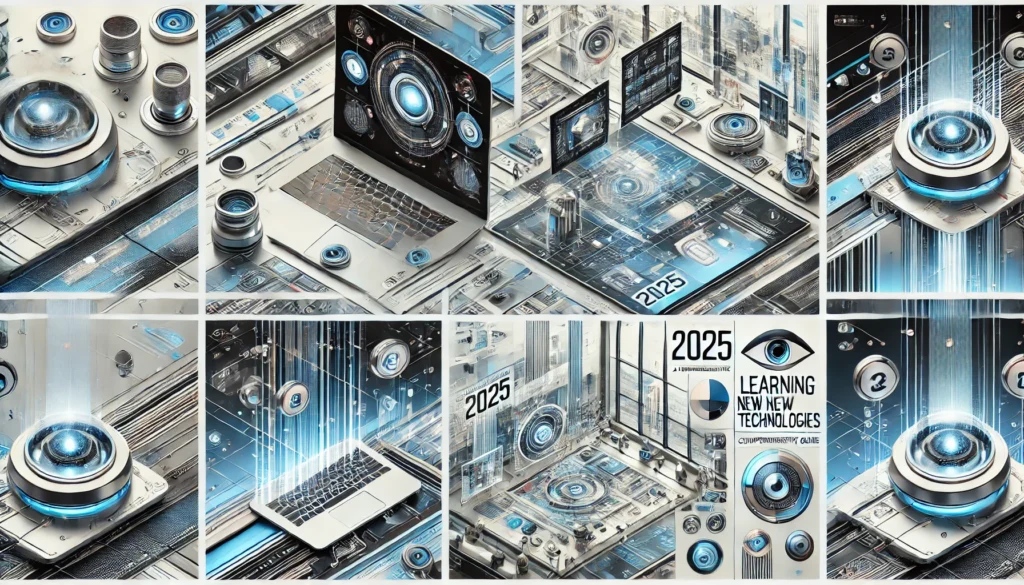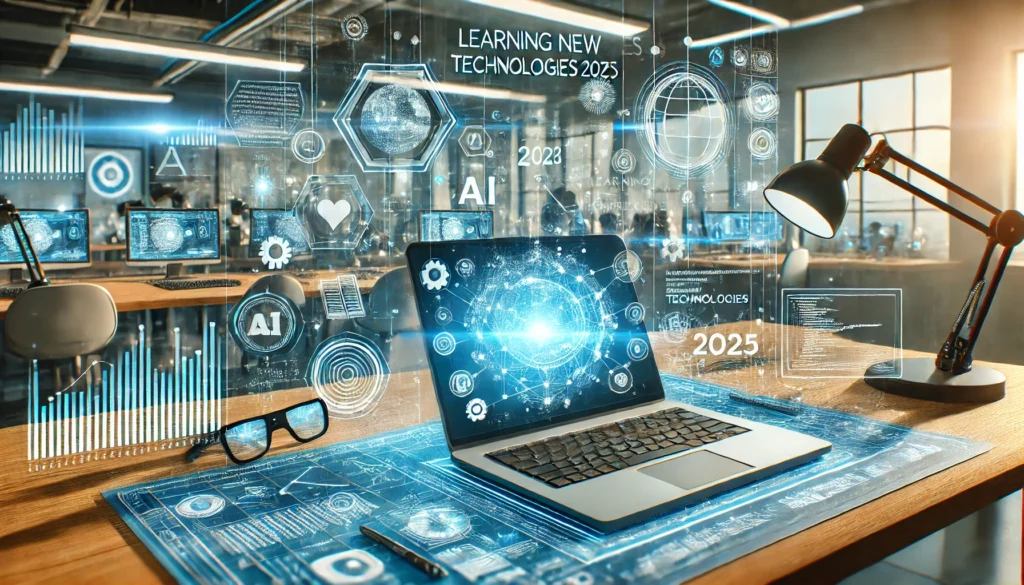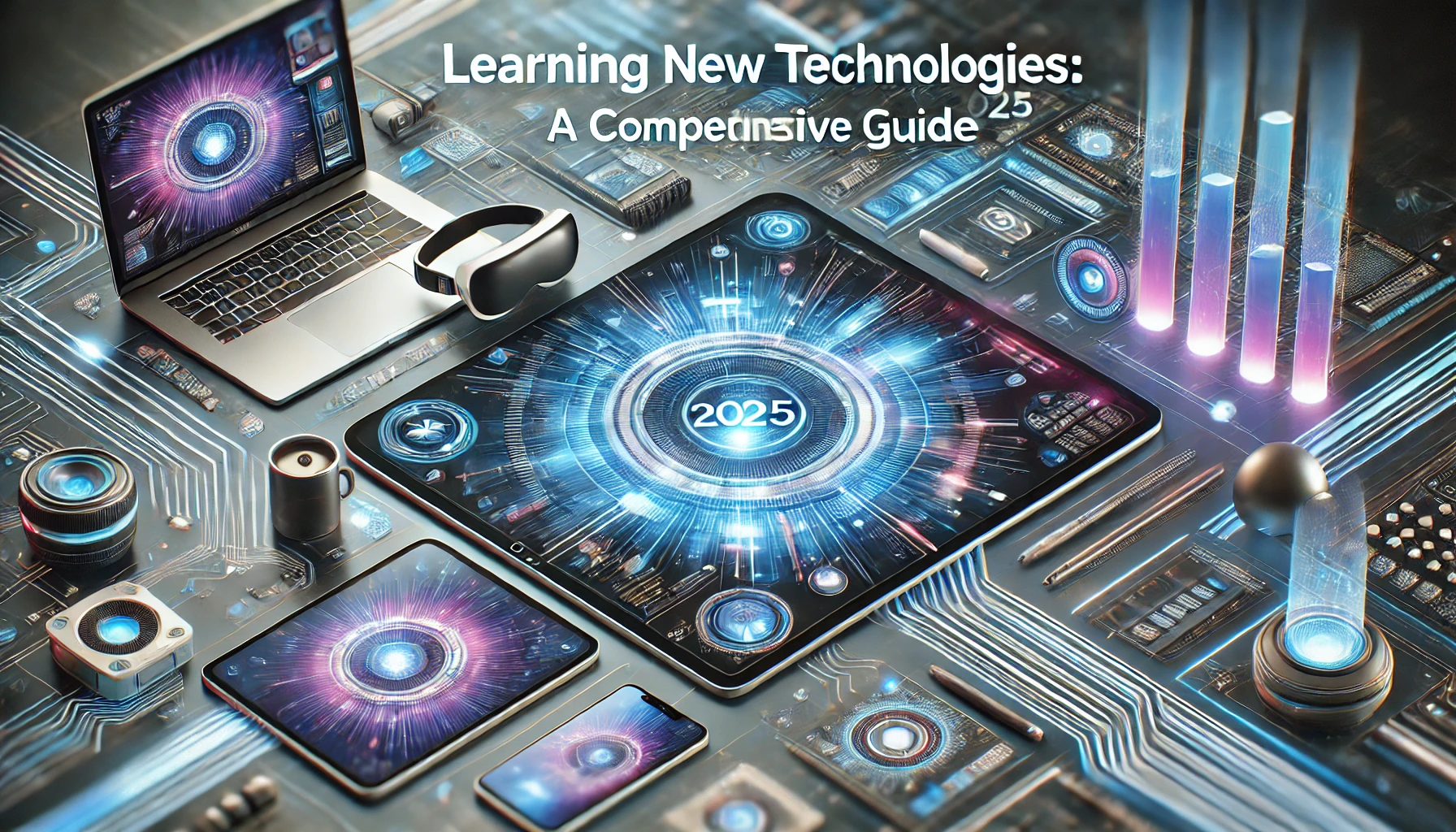Learning New Technologies 2025 towards shaping your future, includes AI, blockchain, IoT, quantum computing, and green tech. Discover courses, workshops, and practical skills to stay competitive in an evolving tech landscape.
Introduction on Learning New Technologies 2025
As we approach 2025, the rapid evolution of technology demands a proactive approach to learning and upskilling. Here, we explore 24 transformative technologies shaping the future, alongside recommended courses, workshops, and practical experiences to stay ahead in the tech landscape.
- Artificial Intelligence (AI) and Machine Learning (ML)
AI and ML are at the forefront of technological innovation, transforming industries through automation, predictive analytics, and data-driven decision-making. Real-world examples include AI-driven recommendation systems like those used by Netflix and Amazon, and autonomous vehicles leveraging ML for navigation.
- Courses:
- Workshops: AI/ML Bootcamps by Udacity or DataCamp
- Practical Skills: Data analysis, neural network design, and deploying ML models with TensorFlow or PyTorch.
- Quantum Computing
Quantum computing leverages the principles of quantum mechanics to process complex computations faster, with applications ranging from cryptography to material science. For example, Google’s quantum computer achieved quantum supremacy by solving a problem in seconds that would take traditional computers millennia.
- Courses:
- Workshops: Hands-on sessions with IBM Quantum Experience
- Practical Skills: Quantum programming languages (e.g., Qiskit, Cirq), understanding quantum gates, and algorithms.
- 5G Expansion
The rollout of 5G networks is revolutionizing connectivity with faster speeds, low latency, and enabling next-generation technologies like IoT and smart cities. Smart cities like Seoul have adopted 5G to power autonomous vehicles and IoT-based infrastructure.
- Courses:
- Workshops: Industry conferences like Mobile World Congress (MWC)
- Practical Skills: Network optimization, IoT integration, and 5G architecture.
- Augmented Reality (AR) and Virtual Reality (VR)
AR and VR technologies create immersive experiences, transforming sectors like gaming, education, healthcare, and retail. For instance, IKEA’s AR app allows customers to visualize furniture in their homes before purchase.
- Courses:
- Workshops: VR hackathons or ARKit developer meetups
- Practical Skills: AR/VR content creation, 3D modeling, and immersive experience design.
- Internet of Things (IoT)
IoT connects devices to the internet, enabling smarter homes, industrial automation, and innovative healthcare solutions. Smart thermostats like Nest and connected medical devices are prime examples of IoT in action.
- Courses:
- Workshops: IoT hardware prototyping events
- Practical Skills: Microcontroller programming, sensor integration, and IoT security.
- Biotechnology in Agriculture
Advancements in biotechnology are enhancing food security and sustainability through genetic engineering and precision farming techniques. For example, CRISPR technology is being used to create disease-resistant crops.
- Courses:
- Workshops: Field demos by agricultural innovation hubs
- Practical Skills: Genetic modification techniques, sustainable farming practices, and lab work.
- Autonomous Vehicles
Self-driving cars and drones are transforming transportation and logistics by improving safety and efficiency through AI-driven navigation systems. Tesla’s Autopilot and Amazon’s delivery drones illustrate this transformation.
- Courses:
- Workshops: Autonomous vehicle summits
- Practical Skills: Sensor fusion, path planning algorithms, and simulation software.
- Blockchain Technology
Blockchain technology underpins cryptocurrencies and decentralized systems, ensuring secure and transparent transactions across various applications. Ethereum’s smart contracts and supply chain management systems like IBM’s Food Trust demonstrate its potential.
- Courses:
- Workshops: Blockchain hackathons and webinars
- Practical Skills: Smart contract development, decentralized application (dApp) creation.
- Edge Computing
Edge computing processes data closer to its source, reducing latency and bandwidth usage, making it ideal for IoT and real-time applications. Content delivery networks (CDNs) like Akamai exemplify edge computing’s role in speeding up online experiences.
- Courses:
- Workshops: Cloud-native edge computing events
- Practical Skills: Distributed computing, real-time analytics, and IoT edge applications.
- Personalized Medicine
Personalized medicine tailors treatments based on individual genetic profiles, enhancing the effectiveness of healthcare interventions. Companies like 23andMe offer genetic testing services to guide personalized health recommendations.
- Courses:
- Workshops: Clinical research symposia
- Practical Skills: Genetic analysis, personalized treatment design, and bioinformatics tools.
- Neuromorphic Computing
Inspired by the human brain, neuromorphic computing aims to develop more efficient and adaptive AI systems using spiking neural networks. IBM’s TrueNorth chip is a real-world implementation of this concept.
- Courses:
- Workshops: Brain-inspired computing labs
- Practical Skills: Designing spiking neural networks and working with neuromorphic hardware.
- Green Energy Technologies
Green energy innovations focus on renewable sources and energy efficiency to combat climate change and promote sustainability. Tesla’s solar roofs and Powerwall systems are leading examples in this field.
- Courses:
- Workshops: Clean energy expos and innovation labs
- Practical Skills: Energy modeling, PV system design, and energy storage solutions.
- Wearable Health Monitors
Wearable health devices track real-time metrics, empowering individuals with insights to manage their health proactively. Apple Watch and Fitbit are ubiquitous examples of such technology.
- Courses:
- Workshops: Maker spaces focused on wearable tech
- Practical Skills: Wearable design, biometric data processing, and UX design for health apps.
- Extended Reality (XR) for Training
Extended reality merges AR, VR, and mixed reality, offering immersive training environments across industries like healthcare and aviation. Boeing uses VR simulations for aircraft assembly training, reducing errors and costs.
- Courses:
- Workshops: Industry-specific XR training programs
- Practical Skills: Simulated environments creation, XR interface programming.

- Voice-Activated Technology
Voice recognition systems enhance accessibility and provide intuitive human-computer interactions in smart devices. Virtual assistants like Siri and Alexa illustrate the daily applications of this technology.
- Courses:
- Workshops: NLP coding bootcamps
- Practical Skills: Building voice assistants, speech-to-text systems, and integrating APIs like Alexa Skills.
- Space Tourism
Commercial space travel is becoming a reality, offering opportunities for innovation in spacecraft design and orbital systems. Companies like SpaceX and Blue Origin are pioneering this new frontier.
- Courses:
- Workshops: Space camps and aerospace conferences
- Practical Skills: Orbital mechanics, spacecraft systems design.
- Synthetic Media
Synthetic media uses AI to generate or manipulate content, including deepfakes, posing both opportunities and ethical challenges. Platforms like Runway ML allow users to create synthetic videos and images.
- Courses:
- Workshops: AI art generation competitions
- Practical Skills: Generative Adversarial Networks (GANs), video manipulation techniques.
- Advanced Robotics
Robotics is evolving to include more intelligent and adaptive systems, impacting manufacturing, healthcare, and service industries. Boston Dynamics’ humanoid robots showcase the cutting-edge of robotic capabilities.
- Courses:
- Workshops: Robot programming challenges
- Practical Skills: Robot kinematics, control systems, and ROS.
- AI in Cybersecurity
AI-driven tools are enhancing cybersecurity measures by detecting and responding to threats with unprecedented efficiency. Darktrace’s AI-based threat detection is a prime example of its application.
- Courses:
- Workshops: Cybersecurity simulation labs
- Practical Skills: Intrusion detection systems, AI-driven threat analysis.
- Digital Twins
Digital twins create virtual replicas of physical systems for simulation, analysis, and optimization in real time. Siemens uses digital twins to optimize factory operations and predict maintenance needs.
- Courses:
- Workshops: Smart city tech expos
- Practical Skills: Simulation software usage, IoT integration, and real-time analytics.
- Sustainable Technology
Sustainable technology emphasizes eco-friendly solutions and practices to reduce environmental impact across industries. Companies like Beyond Meat are leveraging technology to create sustainable food alternatives.
- Courses:
- Workshops: Eco-innovation challenges
- Practical Skills: Lifecycle assessment, eco-friendly material development.
- Telemedicine
Telemedicine is revolutionizing healthcare delivery, offering remote access to medical care through advanced communication technologies. Apps like Teladoc Health provide virtual consultations, improving accessibility.
- Courses:
- Workshops: Healthcare tech hackathons
- Practical Skills: Virtual care system design, HIPAA compliance tools.
- Nanotechnology
Nanotechnology manipulates matter at the atomic scale, driving advancements in medicine, electronics, and materials science. Nanoparticles are being used in cancer therapies for targeted drug delivery.
- Courses:
- Workshops: Nanotech labs and symposiums
- Practical Skills: Nano-fabrication, molecular engineering.
- AI TRiSM (Trust, Risk, and Security Management)
AI TRiSM focuses on ensuring AI systems are ethical, secure, and transparent, addressing concerns about bias and compliance. Microsoft’s Responsible AI framework exemplifies the implementation of AI ethics.
- Courses:
- Workshops: AI governance webinars
- Practical Skills: Compliance frameworks, risk assessment, and bias mitigation in AI.
Conclusion on Learning New Technologies 2025
As we look toward 2025, staying competitive in the ever-evolving technological landscape requires continuous learning and adaptation. This guide has outlined 24 transformative technologies shaping the future—from AI and blockchain to quantum computing and sustainable tech—providing a roadmap for skill development. By exploring recommended courses, workshops, and practical experiences, learners can prepare for emerging challenges and opportunities. Start your journey today to master these groundbreaking innovations and become a leader in tomorrow’s world of technology.

FAQs on Learning New Technologies 2025
Q1. What are the best courses to learn AI and machine learning in 2025?
For mastering AI and ML in 2025, consider:
- Stanford’s AI Certification: A comprehensive program covering machine learning fundamentals.
- Google’s ML Crash Course: Free and practical for beginners.
- Andrew Ng’s Deep Learning Specialization: Ideal for deep learning enthusiasts.
These courses include hands-on exercises in data analysis, neural networks, and TensorFlow, catering to beginners and advanced learners.
Q2. Where can I find practical workshops for quantum computing enthusiasts?
Explore:
- IBM Quantum’s Qiskit Global Certification Program: Includes practical training with quantum systems.
- Quantum Computing Fundamentals by edX: Focuses on quantum mechanics concepts.
- Hands-on sessions with IBM Quantum Experience: Practice quantum algorithms in real-world scenarios.
Q3. How can I master blockchain technology by 2025?
Master blockchain with:
- Blockchain Specialization by Coursera: A multi-module program exploring blockchain applications.
- Hyperledger Fabric Training: For enterprise blockchain development.
- Blockchain hackathons: Gain practical experience by building decentralized apps.
Q4. What are the top IoT devices and security training programs?
For IoT enthusiasts:
- IoT Foundations by Cisco: Covers IoT fundamentals.
- IoT Specialization by Coursera: Advanced IoT design and integration.
- IoT hardware prototyping events: Practical sessions for hardware projects.
Q5. Which tools are recommended for augmented reality (AR) development?
The best AR tools and resources include:
- Unity’s AR/VR Development: Learn to design immersive AR experiences.
- XR Foundations by Coursera: Comprehensive AR/VR education.
- ARKit Developer Meetups: Network with AR professionals and enhance skills.
Q6. What are the latest green energy technology trends and training programs?
Stay ahead with:
- Renewable Energy Engineering by Coursera: Covers renewable energy principles.
- Solar Energy Systems Design: Practical training in PV system implementation.
- Clean energy expos: Explore the latest innovations in renewable technologies.
Q7. How can I get a comprehensive guide to digital twin technology in 2025?
Learn digital twins through:
- Digital Twin Technology by edX: Offers foundational knowledge.
- Simulation and Modeling by Coursera: Focused on building virtual models.
- Smart city tech expos: Real-world examples and applications.
Q8. What wearable health monitoring technologies can I explore?
Consider:
- Health Informatics by Georgia Tech: Focused on data analysis in health tech.
- IoT for Healthcare by Coursera: IoT applications in medical technology.
- Maker spaces: Hands-on projects for wearable devices.
Q9. How can I stay updated on space tourism advancements?
For aspiring space professionals:
- Space Science and Exploration by MIT: Covers foundational aerospace concepts.
- Aerospace Engineering by edX: Comprehensive course on spacecraft systems.
- Space camps: Immersive experiences in space exploration.
Q10. What are the most advanced robotics courses and challenges available?
Explore robotics with:
- Robotics Specialization by Coursera: Comprehensive coverage of robotics.
- Modern Robotics by Northwestern University: Focus on control systems.
- Robotics programming challenges: Hands-on competitive learning.
